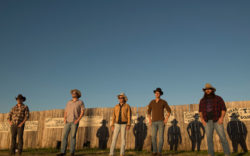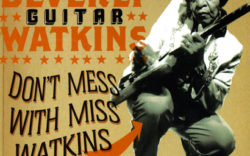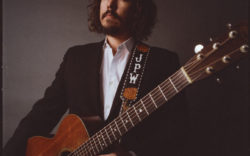Although he released a bevy of good music with his 2015 album Sonic Ranch, Flint, MI-based country singer Whitey Morgan’s most touching song remains 2014’s “Grandpa’s Guitar.” It’s the true story of Morgan’s grandfather, an outlaw who taught his grandson everything he knew about country and bluegrass music.
William Henry Morgan followed factory jobs from southern Kentucky to Flint. A performer in his own right, the elder Morgan played honky-tonks filled with Southern transplants who’d moved north to work for General Motors. By the time he was a grandfather, hard living gave way to picking bluegrass at church and community events.
“He taught me to play when I was really young,” Whitey Morgan says. “I loved playing guitar, and he taught me a lot of chords while we played along to bluegrass and country songs.”
Morgan drifted away from his grandfather’s music as a teenager, opting instead to play punk rock. He came back home, creatively speaking, after his musical mentor’s death.
“He passed when I was 17 or 18, and I inherited his guitar and his country record collection,” Morgan says. “I started focusing more on playing that acoustic and singing country songs. There was something about it that made me feel different about playing music than I’d felt before. Even my first show when I played country music, I hadn’t had that much fun on stage before, and I’d probably been playing on stage since I was 13. I realized what I should be doing, and I’ve been doing it since.”
Grandpa’s wilder days mystify the past, making for some interesting chats with Grandma. “By the time I was old enough to know him, he’d already quit the rowdy shit,” Morgan says. “I only got to hear stories about some of the fun he got into when he was younger. To this day, I still hear stories I’d never heard that my grandmother or my mom will tell me.”
Along with his grandfather’s acoustic guitar, Morgan inherited a cassette recording of him playing and singing a few of his favorite songs. A cover of bluegrass classic “It Takes One” from the cassette closes out the Grandpa’s Guitar album, exposing the younger Morgan’s fans to another great talent.
Sweet memories flood Morgan’s mind when he performs live. “Sometimes when I play a show and there’s 1,000 people there, singing along to the songs that I wrote, I also do a few songs still that I sang with him or that he taught me when I was 12 years old,” he says. “It’s kind of surreal. What would he think? I’m pretty sure he thought I was a lost cause in my teens, because I was playing all kinds of different stuff. I didn’t come back to [country] until he passed, so I imagine it’d be quite a surprise to him to see where I’m at now and to see what I’ve dedicated my entire life to, basically.”
The musical detours Grandpa didn’t get remain important to Morgan’s ongoing career, as his punk days fostered an appreciation for do-it-yourself touring.
“I talk to a lot of up-and-coming people—artists who’ve done the complete opposite—and they’re struggling,” he says. “They don’t know what to do when the record label shelves their record. And they don’t know how to tour on their own, because they’ve never had to do it… I have no problem with that. I could go back to booking my own shows and driving the van. I still book the hotels and do a lot of stuff on my own, because I just have to be in control. I wouldn’t be where I am now without that mentality being instilled into me at a young age.”
Asked whether his appreciation of bluegrass and grassroots fan support reflects a kinship with his grandfather’s Kentucky upbringing, Morgan praises everything great about the state—aside from college basketball. “I grew up going to family reunions down there, and I’ve always loved that state,” he says. “It’s beautiful to drive through, and the people are great. And I have a deep love of bluegrass music and bourbon, also.”
Like what you just read? Support Flagpole by making a donation today. Every dollar you give helps fund our ongoing mission to provide Athens with quality, independent journalism.










